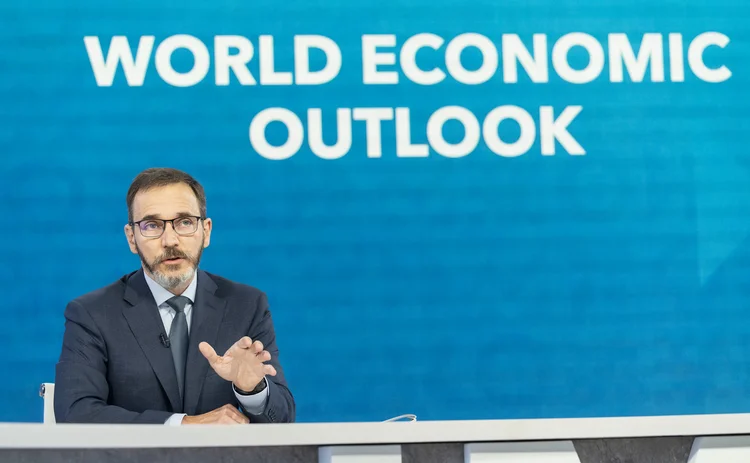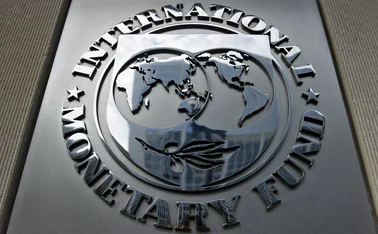
Inflation set to remain high into 2025, IMF warns
Soft landing looks more likely but growth is “limping along”, says Pierre-Olivier Gourinchas

Inflation is likely to remain above target in most countries until at least 2025, the International Monetary Fund said today (October 10).
But the IMF also said that there was more chance of a “soft landing”, where economies avoid both prolonged high inflation and a severe recession.
The IMF’s latest forecasts project global inflation will fall from 8.7% in 2022 to 6.9% this year, and 5.8% in 2024. The fund raised both the 2023 and 2024 forecasts, by 0.1 percentage points and 0.6pp, respectively.
Speaking at the launch of the World Economic Outlook today, IMF chief economist Pierre-Olivier Gourinchas said central banks “have more work to do” to bring inflation down sustainably. “They must avoid a premature easing,” he said.
The report analyses 72 inflation-targeting countries, finding 93% of these will exceed their targets, or the midpoints of target ranges, in 2023. In 89% the IMF expects to see inflation remain above target in 2024, by around 1pp at the median central bank.
Only in 2025 does it expect to see inflation move close to target, sitting 0.2pp above the goal in the median jurisdiction.
The IMF expects greater volatility of commodity prices to add risks to the inflation outlook, driven by climate change and “geopolitical shocks”. Gourinchas estimated a 10% increase in oil prices would drive up global inflation by 0.4pp. He also warned there could be constraints on the supply of other important minerals, such as the lithium used in battery construction.
With interest rates set to remain higher for longer, the global economy is “limping along, not sprinting”, Gourinchas said.
The IMF expects global growth to slow from 3.5% in 2022 to 3% in 2023 and 2.9% in 2024. It forecasts the sharpest slowdowns will be felt in advanced economies.
Despite weakening growth and what the IMF called a “mediocre” medium-term outlook, Gourinchas said the forecast appeared “increasingly consistent with a soft landing scenario”.
Among the major advanced economies, the IMF expects only Germany will see output contract in 2023, at -0.5%. Labour markets in advanced economies are “softening” without a major rise in unemployment, while IMF analysis suggests the risk of a wage-price spiral is fading.
A brighter spot is the US economy, where the IMF revised up its growth forecast due to resilient consumption and investment. The fund now thinks the US economy will grow 2.1% in 2023 and 1.5% in 2024. In April, its forecast put US growth at 1.6% in 2023 and 1.1% in 2024.
Many emerging market economies also proved “quite resilient”, the IMF said, “with the notable exception of China”, where a crisis in the real estate market has deepened in recent weeks.
Gourinchas said the Chinese authorities face a “complex” policy challenge, needing to restructure property companies, preserve financial stability and address local government debt problems. However, “if well executed”, reforms will “enable China’s economy to pivot away from a real estate credit-driven model of growth”.
The IMF’s forecast puts China’s growth at 5% this year and 4.2% in 2024. Other emerging markets are in a stronger position, notably India, which the fund expects will grow by 6.3% in both 2023 and 2024.
Only users who have a paid subscription or are part of a corporate subscription are able to print or copy content.
To access these options, along with all other subscription benefits, please contact info@centralbanking.com or view our subscription options here: http://subscriptions.centralbanking.com/subscribe
You are currently unable to print this content. Please contact info@centralbanking.com to find out more.
You are currently unable to copy this content. Please contact info@centralbanking.com to find out more.
Copyright Infopro Digital Limited. All rights reserved.
You may share this content using our article tools. Printing this content is for the sole use of the Authorised User (named subscriber), as outlined in our terms and conditions - https://www.infopro-insight.com/terms-conditions/insight-subscriptions/
If you would like to purchase additional rights please email info@centralbanking.com
Copyright Infopro Digital Limited. All rights reserved.
You may share this content using our article tools. Copying this content is for the sole use of the Authorised User (named subscriber), as outlined in our terms and conditions - https://www.infopro-insight.com/terms-conditions/insight-subscriptions/
If you would like to purchase additional rights please email info@centralbanking.com
Most read
- ‘Do I die, or do I survive?’ Officials reflect on Basel III complexity
- French president calls for expanded ECB mandate
- ECB says iPhone is currently incompatible with digital euro







